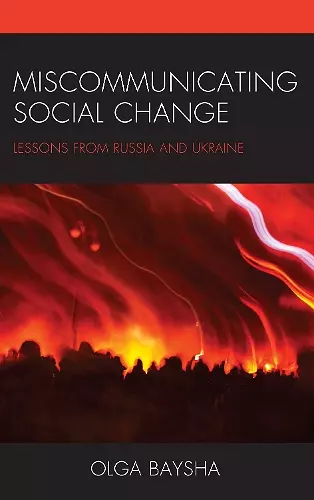Miscommunicating Social Change
Lessons from Russia and Ukraine
Format:Hardback
Publisher:Bloomsbury Publishing PLC
Published:18th Oct '18
Currently unavailable, and unfortunately no date known when it will be back

This open access title analyzes the discourses of three social movements and the alternative media associated with them, revealing that the Enlightenment narrative, though widely critiqued in academia, remains the dominant way of conceptualizing social change in the name of democratization in the post-Soviet terrain. The main argument of this book is that the “progressive” imaginary, which envisages progress in the unidirectional terms of catching up with the “more advanced” Western condition, is inherently anti-democratic and deeply antagonistic. Instead of fostering an inclusive democratic process in which all strata of populations holding different views are involved, it draws solid dividing frontiers between “progressive” and “retrograde” forces, deepening existing antagonisms and provoking new ones; it also naturalizes the hierarchies of the global neocolonial/neoliberal power of the West. Using case studies of the “White Ribbons” social movement for fair elections in Russia (2012), the Ukrainian Euromaidan (2013–2014), and anti-corruption protests in Russia organized by Alexei Navalny (2017) and drawing on the theories of Ernesto Laclau, Chantal Mouffe, and Nico Carpentier, this book shows how “progressive” articulations by the social movements under consideration ended up undermining the basis of the democratic public sphere through the closure of democratic space.
The ebook editions of this book are available open access under a CC BY-NC-ND 4.0 licence on bloomsburycollections.com. Open access was funded by National Research University Higher School of Economics, Moscow
This work will nourish the reflections of researchers interested in radio, public space, communities migrants / minorities and underground cultural production. It will also be of interest to multiple community radio volunteers who want to feed their inspiration for renewed inclusiveness. [Translated from original French] * Communication *
An impressive feat of political and intellectual imagination, although rooted in detailed empirical research. A major landmark in the study of post-communist Russia and Ukraine. -- Richard Sakwa, Professor of Russian and European Politics, University of Kent
One of the most important and original books on the mediation of social change and "development." It tears apart the fabric of neocolonial platitude and calls intellectuals to account for their failure to understand that effective response to social injustice first requires subversion of its corresponding epistemological injustice. -- Oliver Boyd-Barrett, Bowling Green State University
Miscommunicating Social Change is applied discourse theory at its best, driven by theory, but with a keen eye for socio-political complexity and messiness. The book is a chilling and sobering analysis of the derailment of democratic protest and activism, which does away with the romanticism of revolution. It is a grim reminder that social change projects built on essentialist and antagonist logics carry the seeds of destruction, of both themselves and their others. Most importantly, the book convincingly demonstrates how important the discursive is for the study of conflict and democracy, reminding us that we first think the enemy to death, and only then move in for the kill. -- Nico Carpentier, Uppsala University
ISBN: 9781498558938
Dimensions: 237mm x 159mm x 24mm
Weight: 544g
246 pages